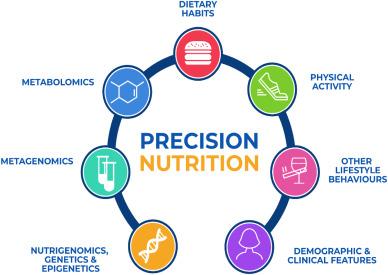In the rapidly evolving world of sports science, precision nutrition is emerging as a game-changer, promising to tailor dietary strategies to the unique biological makeup of individual athletes. Recent discussions highlighted in the article “Precision Nutrition in Sports Science: An Opinion on Omics-Based Personalization and Athletic Outcomes” published in Frontiers delve into how advanced omics technologies-encompassing genomics, proteomics, metabolomics, and more-are revolutionizing the way nutrition plans are crafted. This cutting-edge approach aims to optimize athletic performance and recovery by aligning nutritional interventions with an athlete’s specific molecular profile, offering new hope for enhanced outcomes on and off the field.
Precision Nutrition Revolutionizes Athletic Performance Through Omics Technologies
Emerging omics technologies-such as genomics, proteomics, metabolomics, and microbiomics-are transforming the landscape of sports nutrition by enabling highly individualized dietary strategies tailored to an athlete’s unique biological profile. This precision approach not only identifies genetic predispositions and metabolic capacities but also tracks real-time biochemical responses, allowing for adaptive nutrition plans that optimize energy utilization, recovery, and performance. Athletes leveraging these insights can fine-tune macronutrient ratios, supplement timing, and hydration protocols with unprecedented specificity.
- Genomics: Detects gene variants affecting nutrient metabolism and injury risk.
- Proteomics: Monitors protein expression changes linked to muscle repair and growth.
- Metabolomics: Profiles metabolites to assess fatigue and recovery status.
- Microbiomics: Explores gut flora interactions impacting nutrient absorption and immunity.
| Omics Technology | Key Benefit | Example Outcome |
|---|---|---|
| Genomics | Risk assessment for nutrient deficiencies | Customized iron supplementation |
| Proteomics | Protein turnover analysis | Optimized recovery shakes |
| Metabolomics | Fatigue biomarker detection | Tailored carbohydrate loading |
| Microbiomics | Gut health modulation | Probiotic-enhanced diets |
Several recent studies report measurable improvements when applying omics-informed nutrition protocols, highlighting faster muscle recovery, reduced injury rates, and enhanced endurance capacity. The integration of wearable biosensors and mobile health apps further empowers athletes and coaches by providing continuous data streams that support dynamic adjustments of nutritional interventions. This real-time feedback loop signifies a paradigm shift from one-size-fits-all recommendations to personalized, data-driven nutrition that could redefine competitive advantage in sports.
Unraveling the Genetic and Metabolic Factors Driving Personalized Diet Plans
Advances in genetic sequencing and metabolomic profiling have propelled sports nutrition into a new era where diets are tailored based on an individual’s unique biological blueprint. Rather than relying on generic recommendations, understanding specific gene variants allows practitioners to identify how athletes metabolize macronutrients, recover from exertion, and respond to micronutrient supplementation. For instance, polymorphisms in genes related to lipid metabolism can predict an athlete’s capacity to utilize fat as an energy source during endurance events, while variations affecting inflammation pathways influence recovery timelines and nutritional needs post-training. This synergy between genomics and metabolism opens doors for more precise interventions, optimizing not only performance but also long-term health outcomes.
Implementing these personalized diet plans involves integrating multiple layers of ‘omics’ data, including genomics, proteomics, and metabolomics. Some key insights driving tailored nutritional strategies include:
- Nutrient absorption efficiencies based on gut microbiome interactions
- Metabolic rate variations linked to mitochondrial DNA differences
- Antioxidant defense capacity dictated by gene-environment interactions
- Individual response to carbohydrate and protein intake influenced by enzyme activity genes
| Genetic Marker | Metabolic Effect | Dietary Recommendation |
|---|---|---|
| FTO gene variant | Higher fat storage tendency | Moderate fat intake, increased protein |
| PPARGC1A SNP | Enhanced oxidative capacity | Low-carb, fat-adapted diet |
| IL6 inflammation gene | Elevated inflammatory response | Increased antioxidants, omega-3s |
Challenges and Ethical Considerations in Implementing Omics-Based Nutrition
Adopting omics-based nutrition in sports science presents a multifaceted set of challenges, ranging from technological limitations to data interpretation complexities. High-throughput technologies generate vast datasets that require advanced bioinformatics tools and expertise, often posing significant barriers for smaller research groups and sports clinics. Additionally, variability in individual responses complicates the formulation of standardized dietary recommendations, as athletes differ not only genetically but also in their environmental exposures and lifestyle factors. The integration of multi-omic layers-genomics, proteomics, metabolomics-demands robust computational models to identify meaningful biomarkers predictive of performance or recovery, which remain in early stages of validation.
Ethical considerations are equally critical, as the collection and usage of sensitive genetic and metabolic data raise concerns about privacy, consent, and potential misuse. Athletes may face dilemmas around data ownership and discrimination, especially if results impact team selection or sponsorship opportunities. Transparency about data handling and secure storage protocols must be established to foster trust. Key ethical points include:
- Informed consent: ensuring athletes fully understand implications of testing
- Data confidentiality: protecting against unauthorized access
- Equity of access: preventing undue advantages linked to socioeconomic status
- Potential stigmatization: avoiding labeling based on genetic predispositions
| Challenge | Potential Impact |
|---|---|
| Data Sensitivity | Privacy breaches, mistrust |
| Interpretation Complexity | Misleading recommendations |
| Access Inequality | Widened performance gaps |
| Ethical Oversight Gaps | Legal and moral disputes |
Expert Recommendations for Integrating Precision Nutrition into Athlete Training Regimens
To elevate athletic performance through precision nutrition, experts emphasize a multidimensional approach centered on individual biological markers discovered via omics technologies. Incorporating genomics, metabolomics, and proteomics allows for tailored macronutrient and micronutrient plans that align with an athlete’s unique physiological demands. Coaches and nutritionists are encouraged to prioritize continuous biomarker monitoring to dynamically adjust dietary strategies in response to training cycles and recovery phases. This adaptive framework not only enhances energy optimization but also mitigates injury risk by addressing specific metabolic susceptibilities.
Practical integration demands collaboration across sports science disciplines with an emphasis on accessible, actionable data. Recommendations for teams and practitioners include:
- Regular genetic screening: Identify nutrient metabolism variants critical for metabolism and endurance.
- Customized supplementation protocols: Based on real-time metabolite profiles to support immune function and oxidative stress management.
- Data-driven hydration strategies: Leveraging electrolyte imbalances informed by proteomic markers.
- Periodic re-evaluation: Employ longitudinal omics data to refine nutrition plans throughout the competitive season.
| Omics Layer | Key Focus | Training Benefit |
|---|---|---|
| Genomics | Nutrient Absorption | Personalized Macro Ratios |
| Metabolomics | Energy Utilization | Optimized Recovery |
| Proteomics | Inflammation Markers | Injury Prevention |
Final Thoughts
As the field of sports science continues to evolve, precision nutrition powered by omics technologies stands at the forefront of personalized athletic performance. This emerging approach promises to revolutionize how athletes optimize their diets and training regimens by tailoring interventions to their unique genetic, metabolic, and microbiome profiles. While challenges remain in translating complex omics data into actionable strategies, the potential to enhance athletic outcomes through individualized nutrition is undeniable. As research progresses, the integration of precision nutrition into mainstream sports science could mark a pivotal shift toward more effective, data-driven performance optimization.





